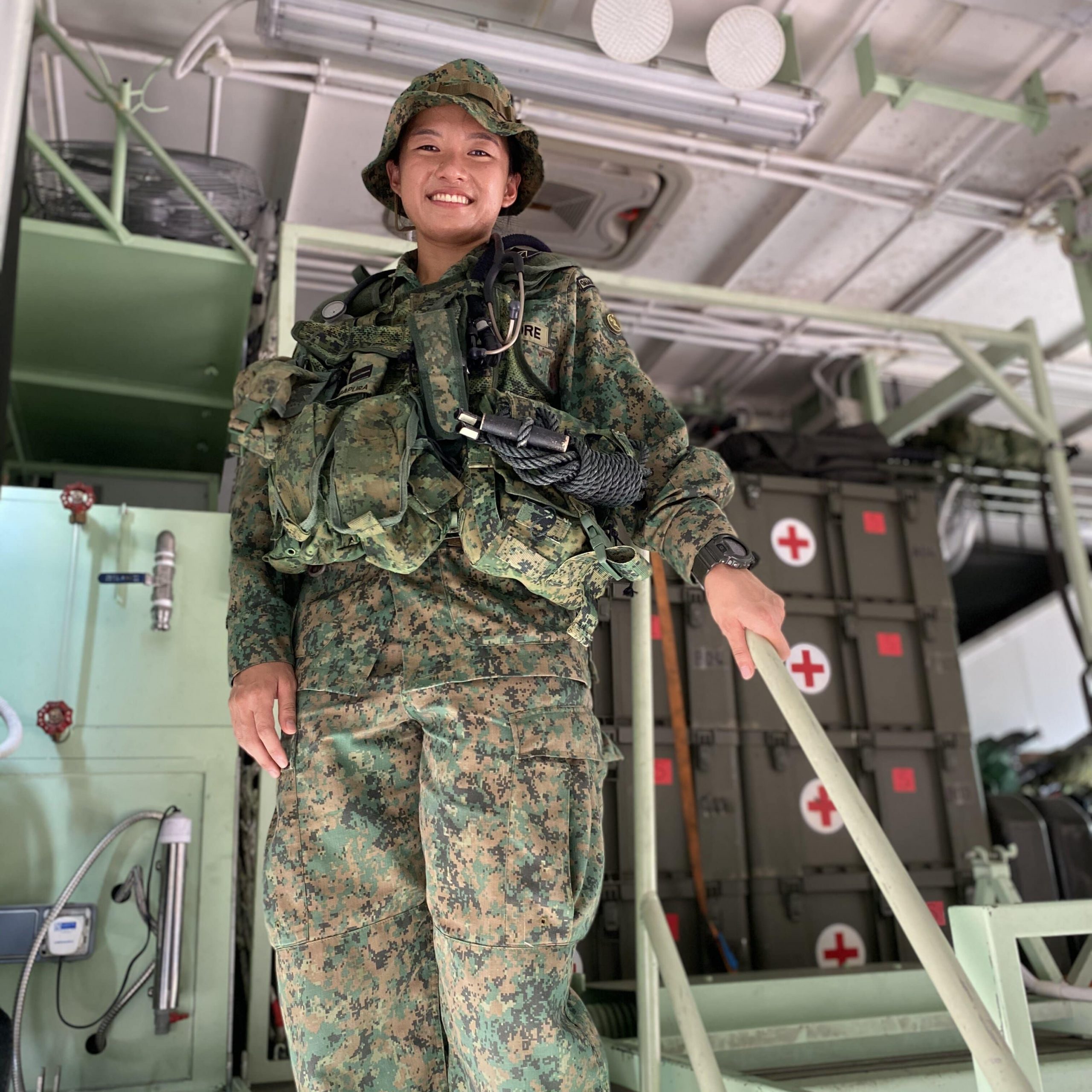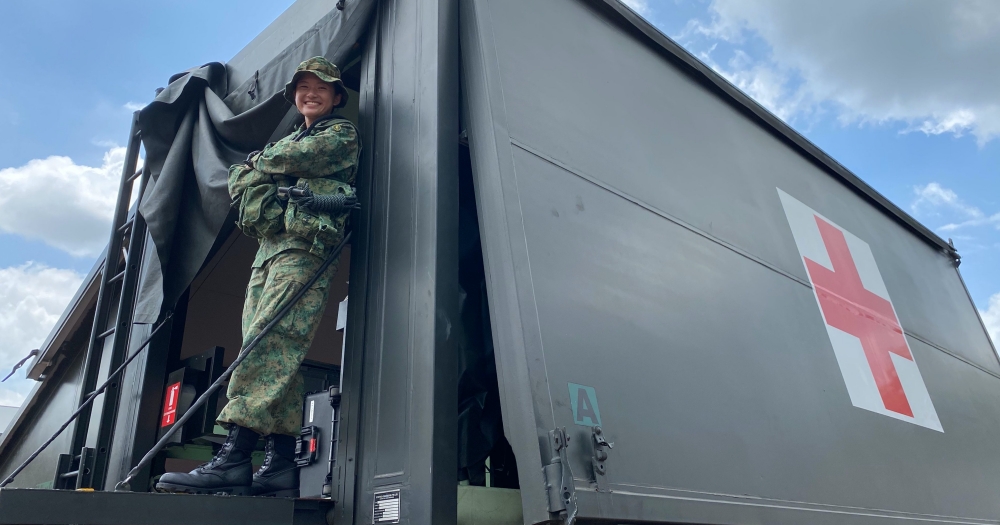An existential crisis.
That was Ng Chen Hui's answer when I asked her why she joined the army.
You might be familiar with Ng's story.
Yes, it's impressive and admirable — being the first female medical officer in the Singapore Armed Forces to complete and pass the Guards Conversion course — but her journey to this point wasn't smooth-sailing.
Ng was 19 and had just completed her junior college education, which is something one tends to cheer about.
She didn't, though. In fact, she was struggling.
You see, she had no clue what to do next — something that's even more surprising considering she had done well enough to get into medicine school.
But she says she had just one — albeit somewhat ambitious — goal for herself: "I knew that I wanted to find some direction which is meaningful that I want to do for the rest of my life."
Decided to pursue a career in the army
How that led to the army remains of great intrigue to me personally, but in the midst of her personal dilemma, Ng says she recalled a talk given by her secondary school senior who had signed on with the SAF.
"I heard about it and I was like, 'Wow, even female can go army?'"
And that simple memory triggered a lightbulb moment.
Ng began going for army open houses to find out more about the army life, and it didn't take long for her to realise that the army could potentially be her calling.
"I grew up in Singapore my whole life and I gained a lot from the Singapore education system. I had a very happy childhood, a very safe environment. So I feel like I owe it to Singapore to contribute and give back."
And as it turns out, some six years on, she still does feel taking this path has helped her achieve her goal — to do something meaningful in life.
First female medical officer to complete Guards Conversion Course
Now 25, Ng is an SAF medical officer (and a certified medical doctor to boot), after receiving her medical degree at the National University of Singapore (NUS).
She also happens to be the first female SAF medical officer to complete the gruelling Guards Conversion Course (GCC).
 Photo by Faris Samri.
Photo by Faris Samri.
What truly perplexed me, though, was the fact that the GCC was optional for her.
Yes, you read that right — she didn't have to do it, but she did it anyway.
So why on earth would someone willingly and voluntarily put themselves through:
- A 10km combat march while carrying 30kg of full combat load
- Swimming in the open sea for about an hour, and
- Back-to-back missions with very little sleep?
But it is perhaps here that Ng's overachieving side emerges: you see, she isn't just a soldier or a medic. She's also a leader, a role she is clearly — to me, at least — dedicated to.
"Coming in as a young girl who had recently just graduated from my own Medical Officer Conversion Course, I have to lead medics who have been regular soldiers in the army for a very long time.
And I want to be able to connect with them at a very different level, to go through what they have been through, so that I know what are the challenges they faced and how tough is their training. That way, we can have a tighter connection and teamwork."
Yep, I was shaking my head in disbelief too, but I was also very impressed.
Being a woman in the army
As if the demanding physical trainings weren't enough, there was one extra "challenge" Ng had to contend with.
Perhaps a bit sadly, it's something her other male medics — or any other type of soldiers even — won't have to experience either.
On top of being a soldier and a medic, as well as a leader, Ng knows full well she is seen as, first and foremost, a woman.
Back in 2013, when she first started her Basic Military Training (BMT), she found herself at the receiving end of weird stares from strangers, especially when she donned her full army uniform.
It's an uncomfortable and daunting experience any girl who has done things that girls don't usually do will have gone through before — as I listened to Ng, I, too, had flashbacks of being laughed at and called names for being the only female football player when I was in school.
"People are not used to having a female around. But those (stares) are all secondary. The reason I joined the army is very clear. I knew what I wanted to do and why I wanted to do it. Everything else, I'll just ignore."
Support from family and friends
And it wasn't just strangers who were baffled by her decision to join the army — her parents were initially shocked and confused too.
Having their eldest daughter sign on in the army was a bombshell for both of them.
But Ng tells me she's thankful they eventually allowed her to, despite their doubts.
"I'm very grateful for my family for supporting me," she says, although she admits her parents always wanted her to pursue what she wanted so there was no way they could stop her anyway.
Ng was also thankful for her friends, who have been equally encouraging.
"They are very supportive, especially my guy friends since I have a common experience with them. So we have more things to talk about. That has been quite good."
Going to the toilet in the jungle
But it wasn't always that way.
Initially, some of her friends asked her if she had to shave her head bald, or worse, if her field pack was lighter than the ones the men carried.
"Actually, we carry a bit more than the guys because in our admin pack, the guys only put their underwear and socks in. But for me, I have to put in my bra and pads. So it's a bit heavier."
The mention of pads brought to mind an unpleasant memory of 16-year-old me stuck in Pulau Ubin for five days at a camp, where out in the jungle one night I happened to get my period — without a doubt the worst week in my entire life.
But hey, likely nothing compared to Ng's experience every time she's on an outfield mission.
She shrugs this off, though:
"I go to the toilet like how other guys do it in the jungle. I just find a secluded spot and just do my business.
Yes, it takes a lot of adjusting but I think it's still okay. Most important thing is to keep optimistic. It's just a minor discomfort in the grand scheme of things."
As she continued talking, three words kept floating through my mind: "What a woman."
Ng's gender, and everything that comes with it, was never a hindrance, mainly because she didn't let it be.
And although she had support from her family and friends, she credited her own mental resilience too, something I feel all women should do more — myself included.
Before I ended my conversation with Ng, she tells me this:
"With every milestone that I cleared, I realised that the challenge is more mental than physical. It doesn't matter if you're female or male. It's the same thing."
"We are stronger than you think."
Indeed, we are.
Top photo by Faris Samri.
If you like what you read, follow us on Facebook, Instagram, Twitter and Telegram to get the latest updates.
